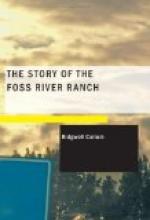The Hon. Bunning-Ford rose while yet the daylight was struggling to overcome the shades of night. He stood upon the tiny veranda which fronted his minute house, smoking his early morning cigarette. He was waiting for his coffee—that stimulating beverage which few who have lived in the wilds of the West can do without—and idly luxuriating in the wondrous charm of scene which was spread out before him. “Lord” Bill was not a man of great poetic mind, but he appreciated his adopted country—“God’s country,” as he was wont to call it—as can only those who have lived in it. The prairie had become part of his very existence, and he loved to contemplate the varying lights and colors which moved athwart the fresh spring-clad plains as the sun rose above the eastern horizon.
The air was chill, but withal invigorating, as he watched the steely blue of the daylit sky slowly give place to the rosy tint of sunrise. Slowly at first—then faster—great waves of golden light seemed to leap from the top of one green rising ground to another; the gray white of the snowy western mountains passed from one dead shade to another, until, at last, they gleamed like alabaster from afar with a diamond brilliancy almost painful to the eye. Thus the sun rose like some mighty caldron of fire mounting into the cloudless azure of a perfect sky, showering unctuous rays of light and heat upon the chilled life that was of its own creating.
Bill was still lost in thought, gazing out upon the perfect scene from the vantage point of the hill upon which his “shack” stood, when round the corner of the house came a half-breed, bearing a large tin pannikin of steaming coffee. He took the pannikin from the man and propped himself against a post which helped to support the roof of the veranda.
“Are the boys out yet?” he asked the waiting Breed, and nodding towards the corrals, which reposed at the foot of the hill and were overlooked by the house.
“I guess,” the fellow replied laconically. Then, as an afterthought, “They’re getting breakfast, anyhow.”
“Say, when they’ve finished their grub you can tell ’em to turn to and lime out the sheds. I’m going in to the settlement to-day. If I’m not back to-night let them go right on with the job to-morrow.”
The man signified his understanding of the instructions with a grunt. This cook of “Lord” Bill’s was not a man of words. His vocation had induced an irascibility of temper which took the form of silence. His was an incipient misanthropy.
Bill returned the empty pannikin and strolled down towards the corrals and sheds. The great barn lay well away from where the cattle congregated. This ranch was very different from that of the Allandales of Foss River. It was some miles away from the settlement. Its surroundings were far more open. Timber backed the house, it is true, but in front was the broad expanse of the open plains. It was an excellent position, and, governed by a thrifty hand, would undoubtedly have thrived and ultimately vied with the more elaborate establishment over which Jacky held sway. As it was, however, Bill cared little for prosperity and money-making, and though he did not neglect his property he did not attempt to extend its present limits.




